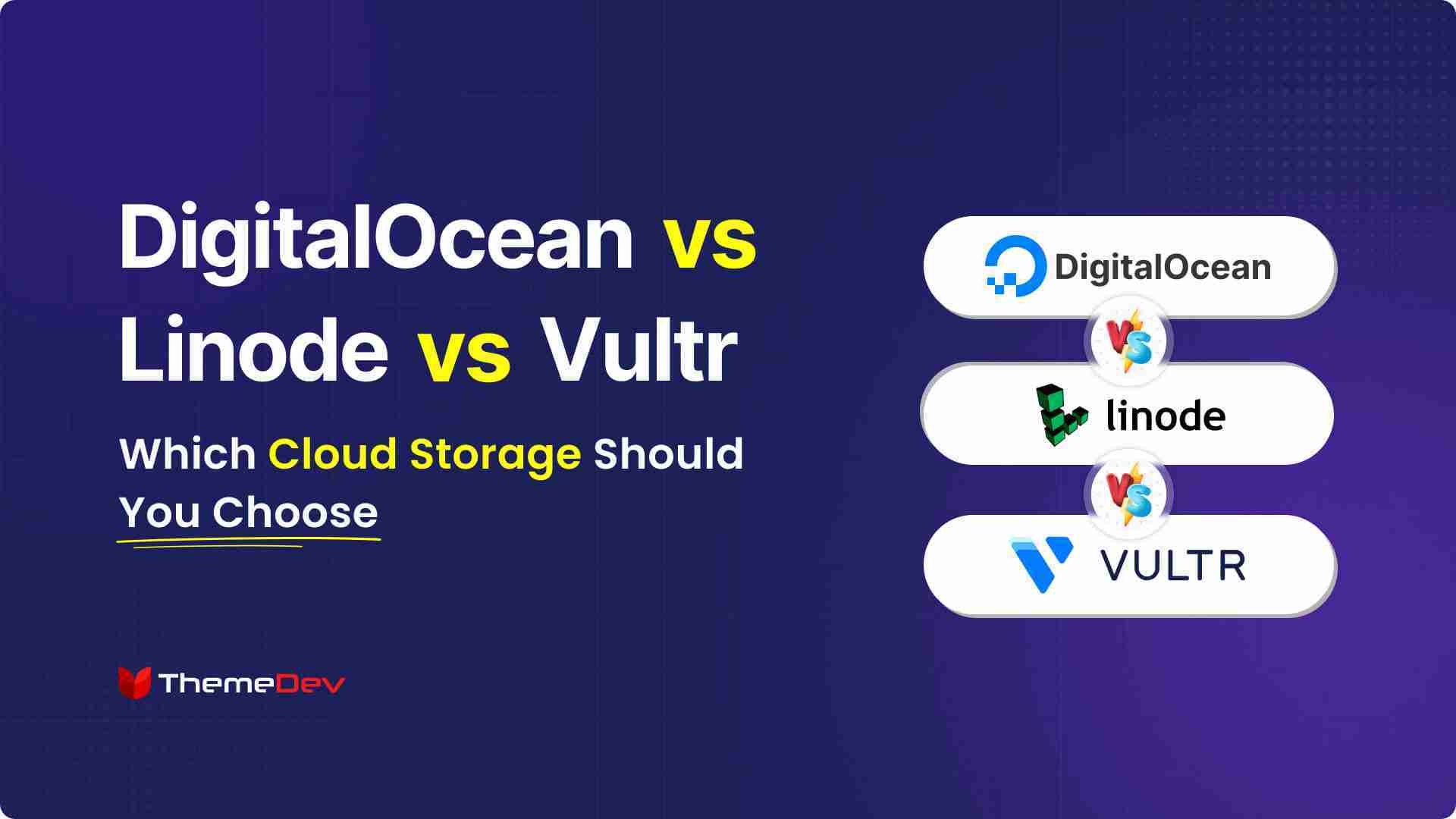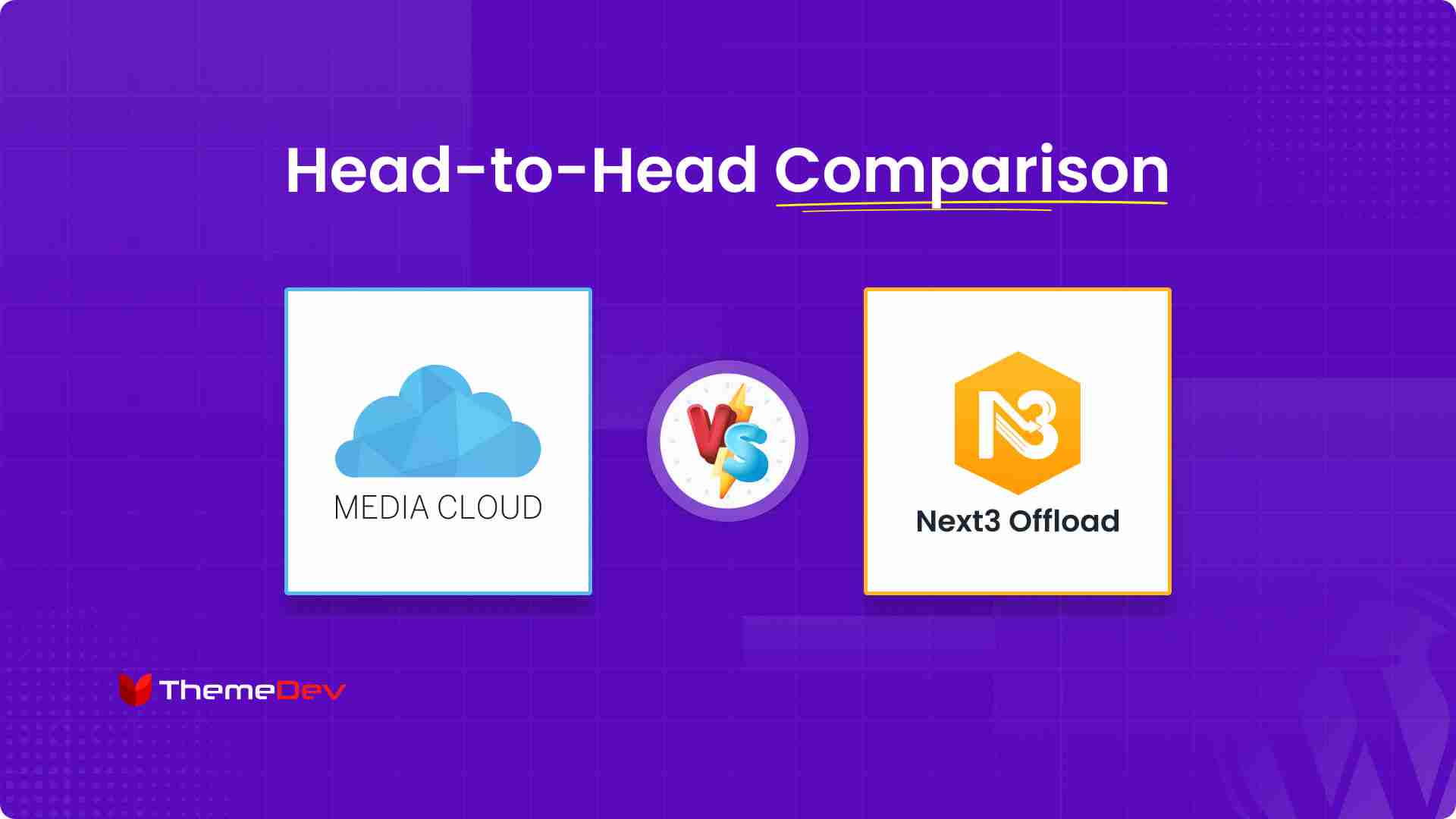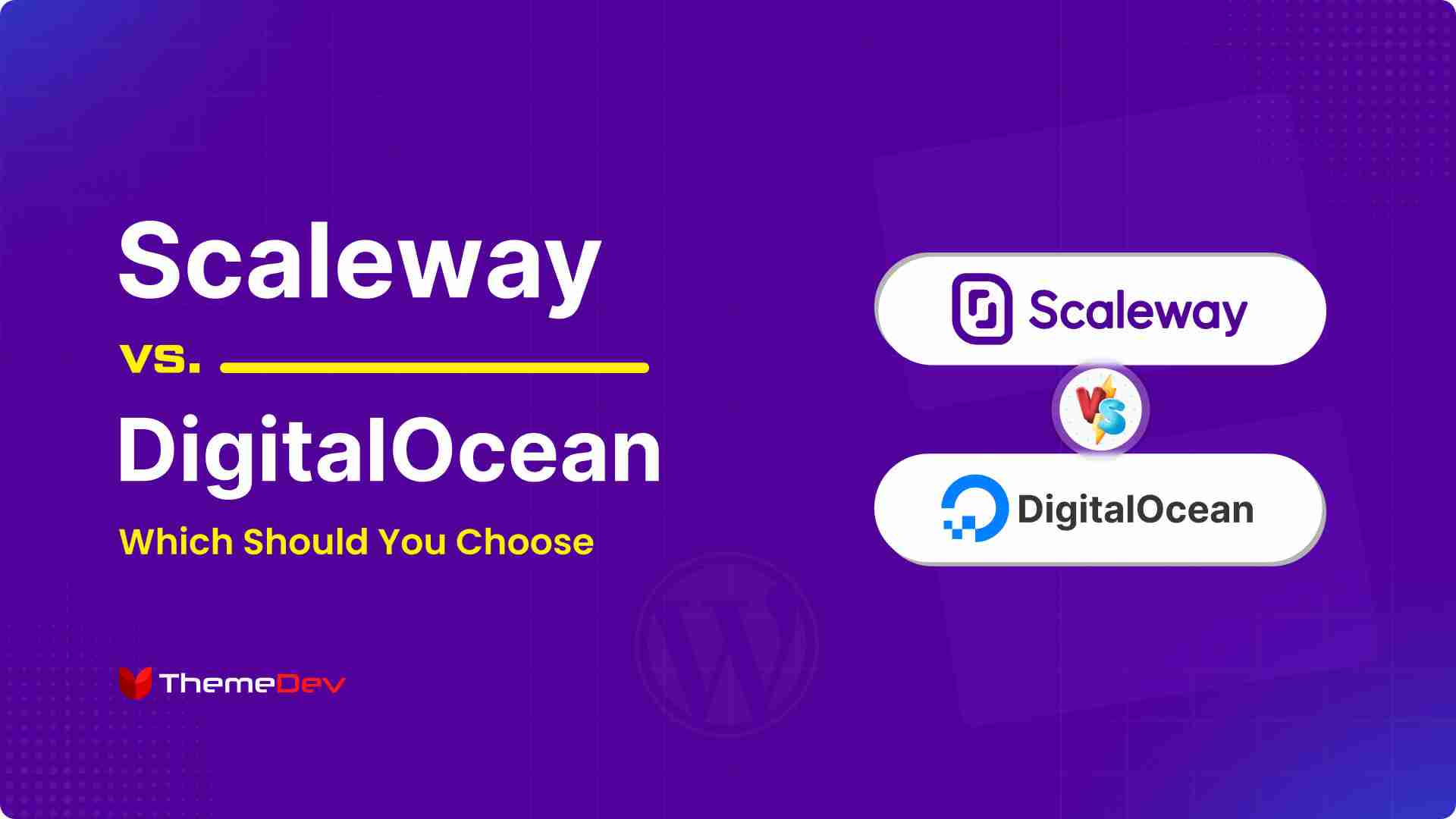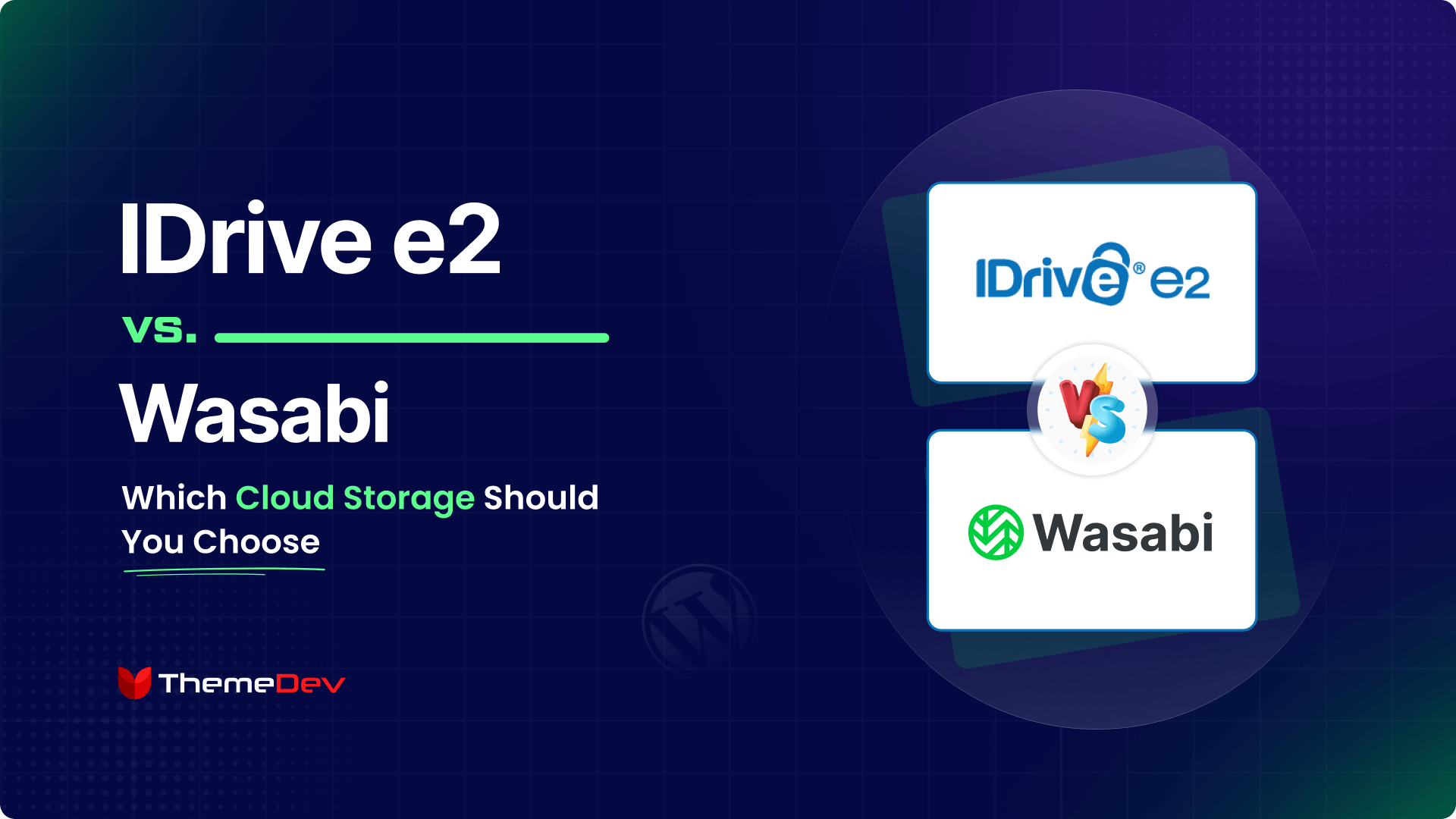Choosing the right cloud storage provider is important. DigitalOcean, Linode, and Vultr are popular cloud storage options. Each platform offers different features for users with various needs. So, you need to know about the comparison on DigitalOcean vs Linode vs Vultr.
DigitalOcean is simple and affordable. It works well for small businesses and startups. Linode provides powerful tools and strong customer support, which is great for developers. Vultr stands out with high-performance servers and global data centers, which are perfect for users who need speed.
This guide will compare DigitalOcean vs Linode vs Vultr. We’ll look at features, pricing, support, and more for each. This will help you pick the best option for your project.
Let’s get started.
Overview of DigitalOcean

DigitalOcean is a cloud platform built for developers. It offers powerful, production-ready tools for projects of all sizes. Whether building AI apps, working on side projects, or starting a business, DigitalOcean provides what developers need.
The platform has a range of products. DigitalOcean Droplets are simple virtual machines for web and VPS hosting. It also offers managed Kubernetes, an easy way to scale applications, and an app platform, a fully managed service that allows users to launch apps quickly. Developers can use managed databases for MongoDB, Kafka, MySQL, and PostgreSQL. Storage options like Spaces object storage and Volumes block storage are also available. DigitalOcean ensures 99.99% uptime for reliable app performance.
DigitalOcean focuses on simplicity and affordability, making it great for startups and small businesses. The platform has predictable pricing with a strong price-to-performance ratio. DigitalOcean offers free support, with upgrade options for dedicated help. Learning resources and documentation are also available to guide users through using the platform.
Features
- DigitalOcean provides simple virtual machines called Droplets for web and VPS hosting.
- The platform includes managed Kubernetes for easy app scaling.
- The App Platform is a fully managed service that helps launch apps quickly and easily.
- Managed databases are available, including options for MongoDB, Kafka, MySQL, and PostgreSQL.
- DigitalOcean offers storage solutions like Space object storage and Volume block storage.
- GPU Droplets provide high-performance computing for AI and machine learning applications.
- The platform guarantees 99.99% uptime for reliable app availability.
- Predictable, flat-rate pricing makes costs easy to manage.
- Free support is included, with options to upgrade for dedicated assistance.
- Educational resources and detailed documentation help users learn and build effectively.
Learn more: How to Upload WordPress Media Files to DigitalOcean
Overview of Linode

Linode is part of Akamai Connected Cloud. It offers one of the most distributed cloud platforms in the world. The platform supports low-latency, edge-native applications for fast global delivery. With Akamai’s network, developers can build and deploy applications closer to users for better performance.
It offers low egress fees and a free egress allowance to help manage cloud costs. The platform is built for scalability, with multiple compute regions and distributed locations to meet global demand.
Linode allows cloud portability, so businesses can choose the right technologies for their workloads. Expert support is available 24/7, providing help whenever needed. With Akamai’s infrastructure, Linode supports the development of AI-powered applications and data-driven experiences, backed by a powerful edge network.
Features
- Linode offers one of the most distributed cloud platforms in the world, providing excellent global coverage for applications.
- The platform supports low-latency, edge-native applications designed for fast and responsive delivery.
- Linode features simple, flat-rate pricing that makes cloud budgeting easy and predictable.
- It provides low egress fees along with a free egress allowance to help keep cloud costs manageable.
- Linode is built for scalability, with multiple core compute regions and distributed locations to meet global customer demands.
- The platform allows for cloud portability, enabling businesses to select the best technologies for different workloads without relying on proprietary services.
- Expert support is available 24/7, ensuring that help is always accessible when needed.
- With Akamai’s infrastructure, Linode supports the development of AI-powered applications and data-driven experiences.
- Linode is backed by one of the most powerful and widely distributed edge networks, enhancing application performance and reliability.
Learn More: How to Upload WordPress Media Files to Linode Object Storage
Overview of Vultr

Vultr offers a global, automated cloud infrastructure for developers and businesses. It provides different computing options, including virtual machines, bare metal servers, and a managed Kubernetes engine. These solutions support a range of workloads, from general-purpose apps to demanding AI and machine learning tasks.
For AI and ML applications, Vultr has powerful GPU instances. These include AMD and NVIDIA options for model training, inference, and high-performance computing (HPC).
Vultr also offers flexible solutions like Optimized Cloud Compute for high-performance applications. Bare Metal servers provide dedicated resources, and Serverless Inference helps deploy AI models without complex setups. The Vultr Kubernetes Engine and Container Registry make it easy to build cloud-native applications. With simple pricing, Vultr allows businesses to scale without unexpected costs.
Features
- Vultr offers a global cloud infrastructure with 32 worldwide locations, providing low-latency access for users around the world.
- It provides a range of cloud solutions, including virtual machines, bare metal servers, and Kubernetes, allowing users to choose the best fit for their workloads.
- Vultr’s Cloud GPU options include AMD and NVIDIA GPUs, optimized for AI, machine learning, and high-performance computing, starting at affordable hourly rates.
- Optimized Cloud Compute instances feature NVMe SSDs and are built to avoid resource-sharing issues, ensuring high performance.
- Bare Metal servers are available with no virtualization layer, offering dedicated resources for demanding applications.
- Vultr offers managed Kubernetes and containerized services, making it easy to deploy and scale cloud-native applications.
- Serverless Inference enables rapid AI model deployment without complex infrastructure setup, ideal for machine learning tasks.
- Vultr provides a composable cloud with storage and database solutions, allowing businesses to adjust resources as needed.
- The platform includes robust APIs for managing cloud resources, making integration and automation straightforward.
- Vultr offers simple, predictable pricing with low egress fees, helping businesses avoid unexpected costs while scaling.
Learn more: How to Upload WordPress Media Files to Vultr: The Ultimate Guide
Detailed Comparison: DigitalOcean vs Linode vs Vultr
Abstract
DigitalOcean: DigitalOcean has established itself as a leading cloud service provider focused on simplifying cloud computing for developers. It offers a comprehensive suite of products that cater to various needs, from simple web hosting to complex application development. The platform is particularly popular among startups and small to medium-sized businesses (SMBs) for its pricing and user-friendly interface.
Linode: Now part of Akamai Connected Cloud, Linode positions itself as a powerful option for developers looking to deploy low-latency applications. Its distributed cloud architecture leverages Akamai’s extensive network, enabling faster data delivery and reduced latency. Linode aims to provide predictable pricing and reliable performance, making it a strong contender for both small projects and larger enterprise applications.
Vultr: Vultr is known for offering a global and automated cloud infrastructure. It features a wide range of solutions, including cloud GPUs, virtual CPUs, bare metal servers, Kubernetes, and flexible storage options. Vultr emphasizes easy deployment with 32 worldwide locations, providing powerful resources like NVIDIA and AMD GPUs optimized for high-performance computing and AI workloads. Its offerings include cloud compute instances starting at $2.50/month and dedicated bare metal servers, allowing users to tailor solutions to their specific needs.
Pricing
DigitalOcean: It offers competitive pricing that starts at $4 per month for basic Droplets. GPU Droplets start at $2.50 per GPU per hour.
Linode: The pricing for storage is $5 per month for 250 GB, with an outbound transfer limit of 1 TB and the ability to manage up to 1 billion objects per cluster.
Vultr: The pricing for the cloud instance includes 1 vCPU, 0.5 GB of memory, 0.50 TB of bandwidth, and 10 GB of storage, with a monthly cost of $2.50 and an hourly rate of $0.004.
Performance
DigitalOcean: DigitalOcean is recognized for its reliable performance, supported by a 99.99% uptime SLA for Droplets. Its infrastructure is built to ensure minimal downtime and rapid response times, making it suitable for critical applications.
Linode: Linode emphasizes performance with its low-latency architecture, leveraging Akamai’s network. This setup enables developers to deliver applications that perform well globally, making it ideal for users focused on speed and reliability.
Vultr: Vultr boasts high-performance instances, utilizing solid-state drives and the latest AMD and Intel processors for optimal speed. The platform guarantees 100% uptime and offers robust performance for various workloads, ensuring users can rely on its infrastructure for demanding applications.
Support
DigitalOcean: DigitalOcean offers extensive community support, including forums and documentation. It also provides a ticket-based support system, with additional premium support options available for those needing faster response times.
Linode: Linode is known for its award-winning support team, available 24/7 to assist users with any issues. The platform also provides comprehensive knowledge.
Vultr: Vultr provides standard support through its documentation and community forums. Users can access additional support options for a fee, ensuring they receive the help they need when facing challenges.
Use Cases
DigitalOcean: DigitalOcean is ideal for web developers, startups, and small to medium-sized businesses that require a simple, reliable cloud platform. It is particularly effective for hosting websites, developing applications, and scaling projects efficiently.
Linode: Linode is best suited for developers and enterprises needing low-latency applications and scalability. It is a good choice for projects that demand high responsiveness, such as real-time applications and edge computing workloads.
Vultr: Vultr caters to users looking for easy management of cloud infrastructure, especially those who want to deploy Plesk for website management. It also supports diverse computing options with its global GPU offerings and is suitable for businesses needing simple deployment processes for AI and high-performance computing workloads.
Comparison Table: DigitalOcean vs Linode vs Vultr
Here’s a detailed comparison of DigitalOcean vs Linode vs Vultr. This table ensures easy comparison between DigitalOcean, Linode, and Vultr.
| Feature | DigitalOcean | Linode | Vultr |
| Overview | A leading cloud provider focused on developers. | Part of Akamai Connected Cloud, optimized for low latency. | The cloud platform is known for easy application deployment. |
| User Interface | User-friendly dashboard for easy management. | User-friendly dashboard for easy management. | User-friendly dashboard for easy management. |
| Key Offerings | Droplets, Kubernetes, App Platform, Managed Databases. | Low-latency applications managed databases. | Cloud GPUs, bare metal servers, one-click Plesk deployment, and various instance types. |
| Pricing | Starts at $5/month for droplets with predictable pricing. | Starts at $5/month with a transparent pricing structure. | Starts at $2.50/month, with flexible pricing options. |
| Performance | 99.99% uptime SLA for reliable performance. | Optimized for low latency and high responsiveness. | High-performance SSDs, Intel processors, and 100% uptime guarantee. |
| Scalability | Easy scaling of resources based on demand. | Scalable infrastructure for fluctuating workloads. | Global scalability with various instance types. |
| Support | Community support and a ticket-based system. | 24/7 expert support and comprehensive knowledge base. | Standard support with additional options available. |
| Use Cases | Ideal for web development and small businesses. | Suitable for real-time applications and edge computing. | Best for users needing easy management of web apps. |
| Global Data Centers | Multiple regions for data deployment. | Distributed network for global application delivery. | 32 locations worldwide for reduced latency. |
| API Access | Provides a powerful API for automation. | Robust API for integrating and managing instances. | Offers API for quick resource control and automation. |
| Special Features | Kubernetes support and extensive documentation. | Low-latency focus with a strong edge network. | Easy Plesk deployment and a variety of product offerings, including Cloud GPUs and bare metal servers. |
Recommendation
Choosing and comparing DigitalOcean vs Linode vs Vultr depends on your project needs and budget. DigitalOcean is great for developers and small to mid-sized applications. It has a user-friendly interface and offers tools like managed databases, Kubernetes, and a simple App Platform. With predictable pricing and helpful documentation, DigitalOcean is a popular choice for startups and developers who want a straightforward, scalable cloud option.
Linode, now part of Akamai Connected Cloud, is designed for low-latency and real-time applications. Its global edge network allows developers to deliver fast, reliable applications to users worldwide. Linode’s flexible infrastructure and cloud portability make it a strong choice for businesses that need consistent performance across different locations.
Vultr offers a flexible cloud platform. It allows for quick deployment and has many instance types, including AMD and NVIDIA GPUs, virtual CPUs, and bare metal servers. Users can easily manage their resources with one-click applications like Plesk. Vultr ensures low latency and reliable performance. This makes it a great choice for small projects and developers looking for budget-friendly cloud solutions.
How to Upload Any WordPress Media Files to DigitalOcean, Linode, and Vultr?
You can easily integrate DigitalOcean, Linode, and Vultr with your WordPress website using a Next3 Offload plugin for uploading copies or entirely moving your WordPress Media Files to these cloud storages. As the plugin is an all-in-one plugin, it can offload/upload or move WordPress media files to all these 3 cloud storages without any complications.
You May Also Read
- How to Offload WordPress Media to Any S3-Compatible Object Storage
- How to Offload WordPress Media Files to Cloudian Cloud Storage
- How to Offload WordPress Media Files to Scaleway
- How to Offload WordPress Media to OVHcloud Object Storage
- A guide to the best S3 compatible storage providers
Final Words
After comparing DigitalOcean vs Linode vs Vultr, you can know that each of them offers unique strengths suited to different needs.
The best choice depends on your specific goals, budget, and the level of performance you need. DigitalOcean works well for developers prioritizing simplicity and scalability, Linode is optimal for edge-focused businesses, and Vultr caters to those wanting cost-effective flexibility.
Evaluating these options in light of your requirements will help you choose the cloud provider that best supports your growth and success.
If you enjoyed this article, you can subscribe to our YouTube channel. We provide WordPress video tutorials. You can also follow us on X and Facebook to keep up with the newest updates, news, and special deals.



















